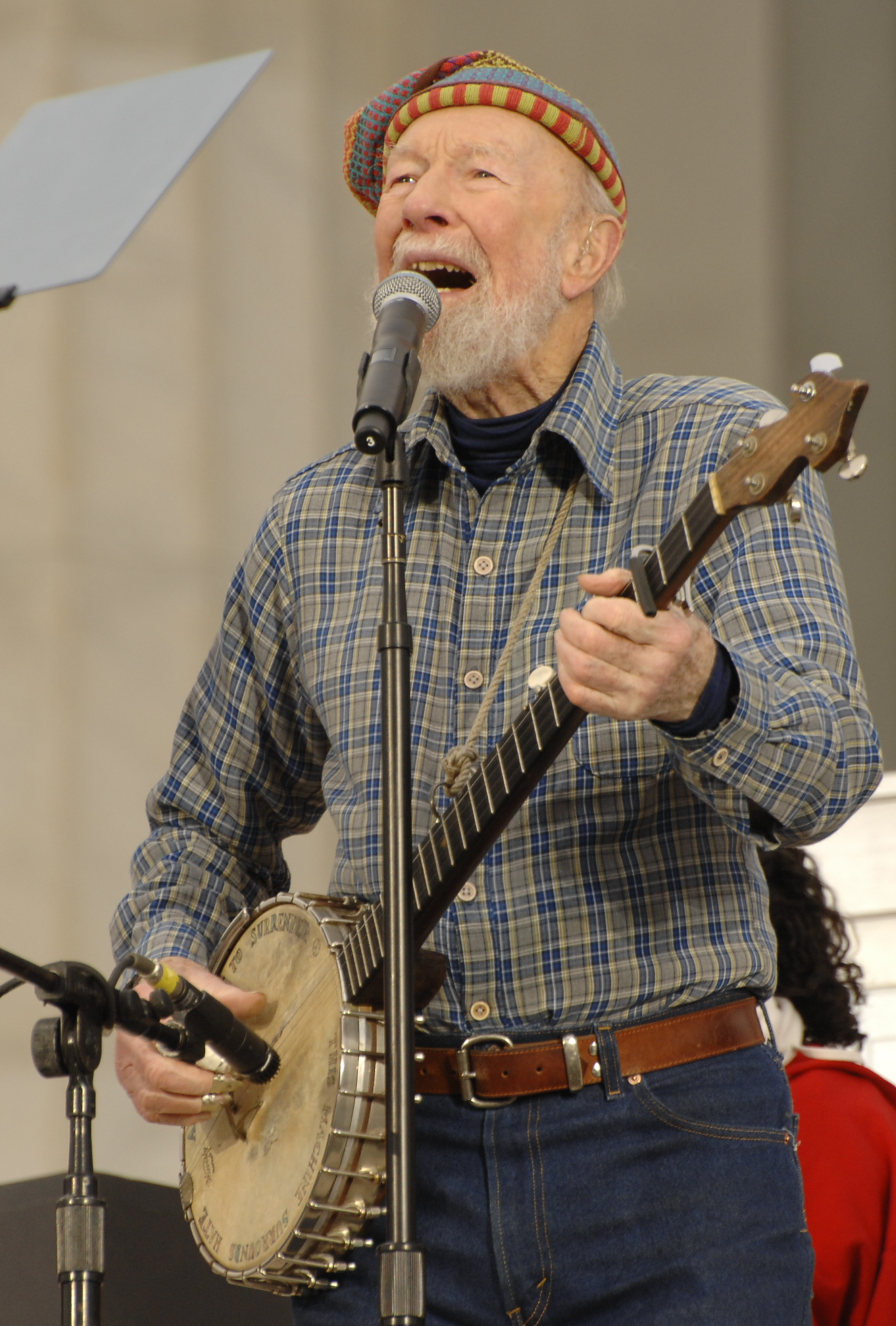Pete Seeger: Citáty v angličtine
“If I had a hammer,
I'd hammer in the morning
I'd hammer in the evening,
All over this land.”
"If I Had A Hammer" (1949) Though Seeger composed the music of this song the lyrics were actually written by fellow member of The Weavers, Lee Hays.
Misattributed
Kontext: If I had a hammer,
I'd hammer in the morning
I'd hammer in the evening,
All over this land.
I'd hammer out danger,
I'd hammer out a warning,
I'd hammer out love between my brothers and my sisters,
All over this land...
Well I got a hammer,
And I got a bell,
And I got a song to sing, all over this land.
It's the hammer of Justice,
It's the bell of Freedom,
It's the song about Love between my brothers and my sisters,
All over this land.
"If I Had A Hammer" (1949) Though Seeger composed the music of this song the lyrics were actually written by fellow member of The Weavers, Lee Hays.
Misattributed
Kontext: If I had a hammer,
I'd hammer in the morning
I'd hammer in the evening,
All over this land.
I'd hammer out danger,
I'd hammer out a warning,
I'd hammer out love between my brothers and my sisters,
All over this land...
Well I got a hammer,
And I got a bell,
And I got a song to sing, all over this land.
It's the hammer of Justice,
It's the bell of Freedom,
It's the song about Love between my brothers and my sisters,
All over this land.
Statement to the court (1961) prior to his sentencing on contempt of Congress charges for his refusal to reveal names of communist or socialist acquaintances before the House Un-American Activities Committee in 1955.
Kontext: I have been singing folksongs of America and other lands to people everywhere. I am proud that I never refused to sing to any group of people because I might disagree with some of the ideas of some of the people listening to me. I have sung for rich and poor, for Americans of every possible political and religious opinion and persuasion, of every race, color, and creed. The House committee wished to pillory me because it didn’t like some few of the many thousands of places I have sung for.
“A good song can only do good, and I am proud of the songs I have sung.”
Statement to the court prior to his sentencing for contempt of Congress (1961); also quoted on NPR: Weekend Edition (2 July 2005)
Kontext: A good song can only do good, and I am proud of the songs I have sung. I hope to be able to continue singing these songs for all who want to listen, Republicans, Democrats, and independents.
“Where have all the flowers gone, long time passing?
Where have all the flowers gone, long time ago?”
"Where Have All the Flowers Gone?" (1955)
Kontext: Where have all the flowers gone, long time passing?
Where have all the flowers gone, long time ago?
Where have all the flowers gone?
Young girls have picked them everyone.
Oh, when will they ever learn?
“And because I love you
I'll give it one more try
To show my rainbow race
It's too soon to die.”
"My Rainbow Race" (1967)
Kontext: One blue sky above us
One ocean lapping all our shore
One earth so green and round
Who could ask for more
And because I love you
I'll give it one more try
To show my rainbow race
It's too soon to die.
Pop Chronicles, Show 33 - Revolt of the Fat Angel: American musicians respond to the British invaders. Part 1 http://digital.library.unt.edu/ark:/67531/metadc19792/m1/, interview recorded 2.14.1968 http://web.archive.org/web/20110615153027/http://www.library.unt.edu/music/special-collections/john-gilliland/o-s.
“All songwriters are links in a chain.”
Interview with Paul Zollo in 1988 https://americansongwriter.com/2014/01/american-icons-pete-seeger/
"Turn! Turn! Turn!" (1954); a song which adapts a passage from the book of Ecclesiastes to music, with a few additional lyrics.
"Pete Seeger's Session" http://www.beliefnet.com/entertainment/music/2006/08/pete-seegers-session?p=2, a Beliefnet interview (2006)
"Where Have All the Flowers Gone?" (1955)
“If it can't be … reused, repaired … then it should be … redesigned or removed from production.”
Berkeley salutes folk singer Seeger http://www.contracostatimes.com/west-county-times/ci_25071210/berkeley-salutes-folk-singer-seeger (6 February 2014)
Zdroj: How Can I Keep from Singing: Pete Seeger (1981), p. 90
Pete Seeger's Storytelling Book, 2001, Houghton Mifflin Harcourt, ISBN 0156013118, p. 220
"A Minstrel with a Mission", Life magazine, 1964.
“If singing were all that serious, frowning would make you sound better.”
Zdroj: How Can I Keep from Singing: Pete Seeger (1981), p. 122
Zdroj: How Can I Keep from Singing: Pete Seeger (1981), p. 117
“I'd really rather put songs on people's lips than in their ears.”
1994 interview, quoted in Filene Romancing the Folk: Public Memory & American Roots Music (2000), p. 197
“This machine surrounds hate and forces it to surrender.”
Inscription on his banjo, inspired by the inscription on Woody Guthrie's guitar : "This machine kills fascists"
Zdroj: How Can I Keep from Singing: Pete Seeger (1981), p. 95
